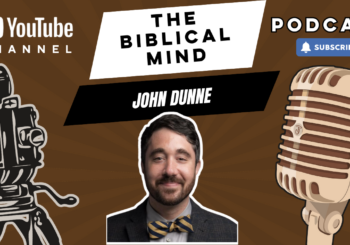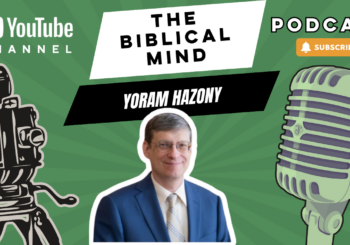The Key Biblical Principle for Police Reform? Humane Imagination
Being a skinhead in Tulsa Oklahoma meant regular encounters with the police. Back in the 1980s/90s, officers didn’t seem to care that our car was full of “anti-racist” skinheads. They didn’t seem to care that we were white, Black, and Hispanic. Most of Tulsa’s finest treated us professionally, though they were predictably annoyed with our drunken and disorderly conduct. And though we all sang along with NWA’s fight song “F*** tha Police,” we also knew that some cops were good eggs—hard-working women and men just trying to do their jobs.
Enjoying this article? Read more from The Biblical Mind.
But I also encountered the hands, fists, and batons of few peace officers. Those officers spoiled the lot for me. I learned to fear sheriff’s deputies most when pulled over on the outskirts of town. Out there, as one deputy once screamed at me, “I can do whatever I want, boy, ‘cause I’ll be the one writing the report!” (Or something like that.) Another time, I remember the frontal chokehold of another deputy sheriff in response to my sarcastic answer to his question. Over thirty years later, I can still feel his fingers trying to meet each other around the back of my trachea.
We all know that policing is difficult. We also know we need police reform. Some American communities have known it longer and with more scars. Most police departments know it too. But what principles will guide such police reform? I want to suggest an odd source for our thinking: the Hebrew Bible (what Christians call the “Old Testament”).
The increase of us-versus-them thinking has only worsened with the tactical fortification of police departments. According to those who track police culture, “to serve and protect” is gone. Now it’s all “bad guys,” “good guys,” and “surviving the shift” for cops these days. Despite all of this, many officers regularly find the courage and wisdom to police as a godly vocation. And praise God for that.
But police reform won’t ever become what we want it to be until we retrieve an ancient biblical notion of humanity and imbue it not only into police training, but also into our own civilian thinking.
The Bible’s Neglected Legal Imagination
The Bible’s legal ethics have too long been underappreciated. The primary shaper of a Christian community’s legal imagination should be Scripture. The guidance we all crave for police reform comes straight from the pages of the Hebrew Bible and gets repeated in the New Testament. Even though there are no instructions to police or incarcerate in the Bible, its thinking shines a powerful light on our path toward more humane policing—policing that can glorify God while it manages the darkest corners of human behavior.
The most radical legal principle in the Bible demands us to consider “the other” as if they were our own brother or mother. Christians often mistakenly think this idea originates in the mouth of Jesus. But he merely quoted these principles from the Hebrew Scriptures. When Jesus cites the teaching “love your neighbor as yourself,” he knew that he was simplifying a more extensive set of legal principles found a finger-length down the Torah scroll from “love your neighbor” (Leviticus 19). It goes on to demand “love [the foreigner] as yourself for you were once foreigners in the land of Egypt.” The biblical authors also demand equal treatment of the poor, the wealthy, the native-born, and the foreigner alike in their marketplace, home, courts, and business practices. By doing so, they are shaping our imaginations of justice and criminality—two highly distorted concepts in American thought and practice.
This simple step of imagining outsiders as if they were close family members generates a matrix of other-inclusion, from neighbors to foreigners, and even high regard for one’s enemies (and their animals too!).1See Exod 23:5; Lev 19:17, 34. The Torah required ancient Hebrews to foster an imagination that sees people who are not one of us as if they were our own father or mother.
Dream with me about nurturing the imagination of novice police officers and fellow citizens to treat every person, no matter how out-of-hand they may be, as if they were their own mother or brother. It does not mean that the use of force and citations will disappear. Police or not, we could all find ourselves in harrowing situations where we might have to use our bodies to intervene to curb violence. The police must courageously employ force for the sake of protecting life, but they must act discerningly in such moments. What a high demand we place upon them! They deserve our prayers.
However, a biblically honed imagination creates the possibility of glorifying God even within the use of force because it transforms our conception of its use. Imagine a training session in a police academy that teaches about the complexities of these encounters, about the powers of arrest and citation, guided by a biblical imagination. A cadet runs through an arrest scenario and is critiqued by a trainer, who then says, “Let’s do it again, only this time, pretend that it’s your mother, Patricia, whom we’re arresting.”
The second biblical principle that can guide police reform might surprise us: “eye for eye, tooth for tooth” (Exod 21:24–25). Despite what many have thought, this principle doesn’t demand retribution. Instead, it restrains retribution only to what was harmed. There is no room for “you touch my stuff, I break your face” in the Bible’s legal reasoning. Ancient rabbis regarded the rule as a type of restraint. Furthermore, the examples in Exodus 21 of this principle being applied feature the more powerful actor as the wrongdoer who receives retribution.
The two sentences immediately following Exodus’ “eye for eye, tooth for tooth” imagine scenarios where someone might be tempted to wield power inappropriately. After the “eye for an eye” general principle, the very next sentence makes its focus specific: “If a man strikes the eye of a servant” he must release him (Exod 21:26). The second sentence makes sure we don’t miss the intended focus, doubling down: “If he knocks out the tooth of a servant,” then he must release the servant (Exod 21:27). Eye for an eye, tooth for a tooth: if you exploit power, then you lose it.
In the end, the legal principle exemplified in these imagined scenarios forces us to question: Whose eye and tooth does this legal code have in mind? In the end, it’s the vulnerable servant’s eye and tooth being protected (and presumably their whole body by extension). The law restrains the boss’s entitled sense of power. “Eye for an eye” does not enforce a simplistic tit-for-tat mentality or literal rule. (Even ancient rabbis couldn’t figure out how to follow this as a rule. They pondered: What if a one-eyed man injures the eye of two-eyed man? Removing his eye would then be a disproportionate punishment.) It’s unclear that it was ever meant to be taken literally. Even more, the two sentences after “eye for eye” do not require its literal enforcement.
Rather, “eye for an eye” instructs us to take extra care to restrain harm and avoid the mistreatment of someone over whom we might wield social, policing, familial, or political power.
Imagine, with the biblical authors, police officers who emerge from a culture that values such a legal vision—officers trained to treat citizenry with such care. Citizens might think of strangers in their neighborhoods as uncles or nieces first, even if they prove to be more like our delinquent relatives.
In cases where police abuse their power to investigate or detain, the favor falls to the vulnerable citizen just as it does in the “eye for eye” servant scenarios (Exod 21:26–27). The officer loses the very power she sought to exploit by not carefully navigating the power disparity in such encounters. This extreme mindfulness of their powers gets imbued into the habits and bodies of police officers through training and re-training. In turn, citizens honor and respect officers who police themselves with this biblical legal vision. When acts of force or arrest inevitably occur, the community tends to support their police who act as their emissaries.
Pre–Police Reform
Before we can reform policing in America, we need to tackle a central problem: how we imagine the other. What do we assume about the person who doesn’t look or smell like us, doesn’t eat our food, and speaks another dialect of American English? Former police officer and police academy trainer Dr. David E. Jackson points to his imagination as the key to community policing: “As a native Atlantan . . . I saw each person as a relative—literally. That imagination dictated my engagement even in the most difficult and sometimes dangerous situations.” Police reform might include different tactics and police accountability boards, but they must also include the imaginative perspective of police officers for the kind of change we all want.
In his Notes on the State of Virginia, Thomas Jefferson taught us about the danger of a poorly formed imagination. However, in Jefferson’s imagination of humanity, “the blacks . . . are inferior to the whites in the endowments both of body and mind.” He lamented that their inferiority was the “powerful obstacle to the emancipation of these people.”2Thomas Jefferson, “Notes on the State of Virginia,” 153, https://docsouth.unc.edu/southlit/jefferson/jefferson.html#p153 He had nurtured a view of the African person as fundamentally other, different from the white person. The brutal treatment of Black people was the unfortunate consequence of this view for as long as whites held power. Dividing humanity into us-versus-them always paves the road to mistreatment of “them.” (And systemic mistreatment of whomever we consider “them” inevitably dehumanizes “us.”) We can attempt to legislate the souls of our police officers, but that has never worked. We can’t simply add five rules for treating people well to police officers’ training. While on duty, they will soon have encounters that no list of rules can cover. Rather than rules, might it not be better to retrieve the grand biblical tradition of imagination-building—seeing the other as if they were our own brother or mother?
Police have a lot of latitude in what they cite and why they arrest and charge, and to a lesser degree in how they apply force. Police discretion in enforcing code violations and in use of force to detain opens opportunities for injustice. Citing or arresting the son of a middleclass family has had notably different effects and outcomes than it has had for other sectors of the population. Those injustices begin with how the officers imagined the people they police, what they assumed, what they’ve witnessed, and how they objectify some while identifying with others.
It’s easy for us to imagine some folks as if they were our mother or brother. But a Hebraic legal imagination requires us to learn how to extend that imagination to every person, and that requires us to train our imaginations Hebraically. This renewed imagination combined with a rigorously enforced care for the citizens’ vulnerabilities pervades biblical thought. The Bible might surprise us here, not only in its ethical and legal innovations, but also because its unique collection of legal principles can guide us toward the police reform and just community we all still want.
End Notes
1. See Exod 23:5; Lev 19:17, 34.
2. Thomas Jefferson, “Notes on the State of Virginia,” 153, https://docsouth.unc.edu/southlit/jefferson/jefferson.html#p153
Image created by Rubner Durais
Did you enjoy this article? Check out The Biblical Mind podcast.





